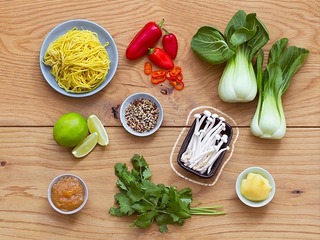

Sun Basket, a delivery service for organic ingredients and recipes, announced that it has secured an $11.6 million Series A round led by Paul Allen’s Vulcan Capital, PivotNorth, and Robertson Stephens Partners. Also participating are Baseline Ventures, The Tyler Florence Group, Rembrandt Ventures, Correlation Ventures, Relevance Capital, Roth Capital, Filter14, and others.


Sun Basket places a heavy emphasis on targeting audiences who want a more natural or healthy alternative. Its homepage shouts the use of organic and non-GMO ingredients, as well the option to order gluten-free, paleo, or vegetarian meals. The company says it focuses on “hand-selected, seasonal ingredients from the Pacific Coats’s best farms,” meaning everything is sustainably sourced, from the grass-fed meats to the responsibly fished seafood.
The service is priced per meal. Customers select three recipes for 2 or 4 people, and each meal costs $11.49. That’s how much I’m willing to pay somebody else to make me a meal, not to cook it myself. But I guess I’m not the target audience here.
Sun Basket is just one of a bevy of tech companies aiming to make the act of gathering ingredients and recipes—so you can cook dinner yourself—more convenient than ever. Other players in the space include Blue Apron ($193 million in VC), HelloFresh ($256 million in VC), Terra’s Kitchen, Home Chef ($17 million in VC), Plated ($56 million in VC), Marley Spoon ($28 million in VC), and Purple Carrot ($5 million in debt financing).
Together, these eight companies alone have raised over a half billion dollars in venture capital.
A couple weeks ago, a BuzzFeed writer Alison Roman tested out all eight of these services by analyzing the actual delivery process, the quality of the recipes and meals, and the actual sustainability practices (especially for packing materials). In her analysis, she gave Sun Basket the top spot:
“The recipes sounded, looked, and tasted great. All the dishes offered were things I wanted to eat, which made me excited to cook them. The instructions were straightforward and easy to execute. While there were a few ingredients in plastic containers, they were things I could potentially re-use (i.e., plastic containers to store leftovers), which I appreciated.”
“Honestly, there wasn’t anything really bad about this service. They kinda nailed it.”
That testimonial, which probably reaches Sun Basket’s core audience of young working professionals, will probably be worth its weight in gold for the company. Especially since the two companies that have raised the most in VC money—HelloFresh and Blue Apron—fell at spots four and six on the list.
Even so, the food tech space has proven notoriously difficult to dominate, as many, many startups have come and gone.Over email, a spokesperson for Sun Basket told me (essentially) that their plan isn’t to dominate the market:
“Just like grocery, there is plenty of room for different types of experiences, so we don’t think there will be one, or even two or three, ‘winners’ in this space. With such an enormous market, there’s plenty to go around e.g., 50,000 customers is a $100MM business. Our target is the 30% of Americans who spend $1000/month on groceries.”
With all this data, it will be interesting to see where Sun Basket and its seven competitors stand a year from today.



















